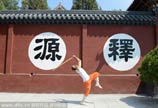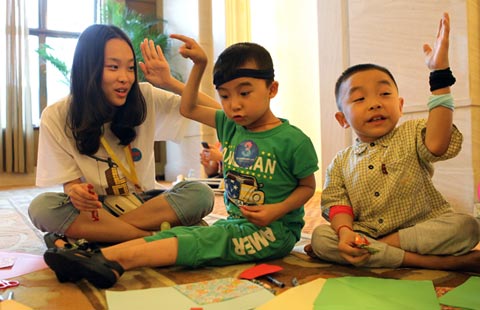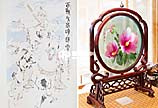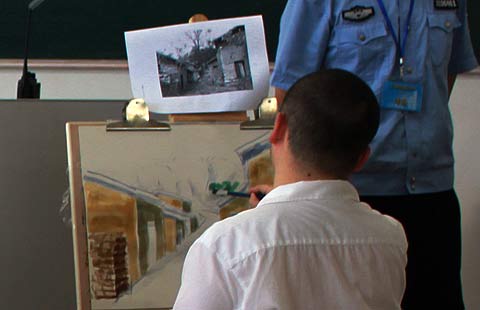Belief in building
By Hou Liqiang, Qi Xin and Zhang Yunbi (China Daily) Updated: 2014-07-22 07:34
|
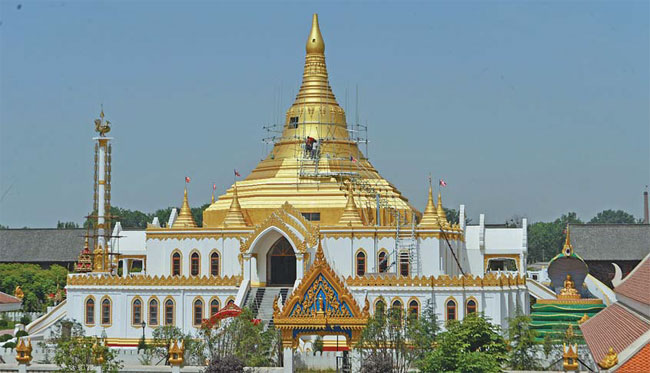 |
|
The Myanmar Buddha hall is seen on May 29. It was inaugurated on June 30. GAO SHANYUE / FOR CHINA DAILY |
|
Religious center Established in AD 68 under the patronage of Emperor Liu Zhuang in the Eastern Han Dynasty (AD25-220), which had Luoyang as its capital, White Horse Temple is the first Buddhist temple in China and the starting point of the spread of Buddhism in the country. One night in AD 64, the emperor had a dream about a man whose body was "brilliant as the sun". The dream inspired the emperor to send two officials westward to search for Buddhist scriptures. The officials persuaded two Indian Buddhist monks they encountered in what is today's Afghanistan to go to China to help spread Buddhism. With the help of two white horses, the four managed to arrive in Luoyang with Buddhist sutras and a portrait of the Buddha three years later. The temple started construction the following year. The emperor ordered the temple to be named in honor of the two white horses. The two Indian monks, Kasyapa Matanga and Dharmaratna, translated many Buddhist classics at the temple. The scriptures translated by Matanga, the Sutra of Forty-two Chapters, is the first Buddhist sutra in the Chinese language. The temple gained importance as Buddhism spread and grew in East Asia and Vietnam. The main buildings of the temple were reconstructed during the Yuan (1271-1368), Ming (1368-1644) and Qing (1644-1911) dynasties. The temple complex was refurbished in the 1950s and in 1972. It was also listed under key national cultural relics protection. The White Horse Temple is a royal temple, said Wang Huijie, director of the Luoyang Administration for Religious Affairs. This means the Buddha halls of all denominations of Buddhism can be built in the temple and Buddhists of different denominations can come to the temple to practice Buddhism, Wang said. - Hou Liqiang |
"The shrines were fabulous. We could experience exotic buildings and cultures. They also stimulated our interest to know more about Buddhism in these countries," said Chen, 30, from the Fourth Military Medical University.
The shrines at the White Horse Temple are built in the style of the Buddhist halls of India, Thailand and Myanmar. Myanmar President Thein Sein on June 30 inaugurated the Myanmar-style shrine, the latest one at the temple to be opened to the public.
Chen wished there were also Buddhists from these countries at the shrines whose activities would be able to give her a better idea and closer experience of their Buddhist culture.
Fortunately for devotees like her, more shrines in foreign styles are expected to be built in the White Horse Temple. The temple, established in AD 68, is considered the first Buddhist temple in China.
"We are trying to build as many shrines as possible in different styles and make full use of Buddhism as a channel to strengthen friendship with different countries," said Peng Yaping, director of Henan Administration for Religious Affairs.
According to an extension plan of the temple complex, more shrines or structures in foreign styles will be built in it by 2020. The International Buddhism Temple zone is expected to be large enough to accommodate another seven shrines or temples.
Following the Indian, Thai and Myanmar Buddha halls, the other foreign shrines will be funded by foreign governments, enterprises or religious groups. Several countries including Sri Lanka and Cambodia have expressed their interest in investing in similar programs.
|
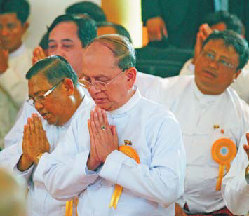 |
|
Myanmar President Thein Sein attends the inauguration ceremony of the Myanmar-style shrine on June 30. XIANG MINGCHAO / CHINA DAILY |
Wang Huijie, director of the Luoyang Administration for Religious Affairs, said there is also similar communication with Japan, the Republic of Korea and Nepal, with help from the Buddhist Association of China and scholars interested in Buddhism exchange.
Three students majoring in Buddhism from Thailand's Chulalongkorn University have arrived in the Thai-style shrine for a 10-month internship, Yinle said.
The Thai-style shrine, built in 1997 with 30 million yuan($4.83 million), is being extended and will be completed in September and reopened to the public soon after.
|
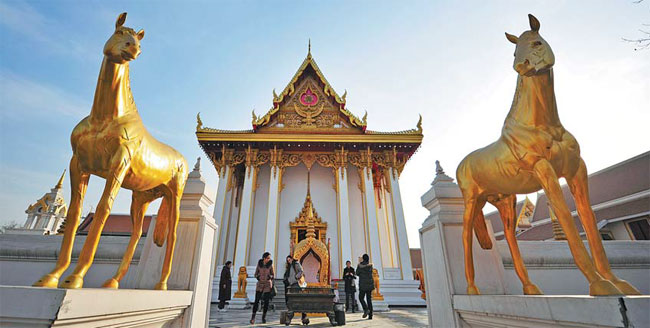 |
| The Thai Buddha hall at the International Buddhism Temple zone of the White Horse Temple is seen on Jan 12. HUANG ZHENGWEI / FOR CHINA DAILY |
- Journalists, PR firms caught 'blackmailing'
- Joint efforts launched to curb illegal abortions
- Changes to gaokao will see all students equal
- Xi marks victory against Japan in World War II
- New awards to honor journalists worldwide
- Silk Road plan to boost jobs in Xinjiang region
- 2 detention house escapees captured; 1 remain at large
- 23 mafia-style gang members stand trial
- 11 miners confirmed dead in SW China landslide
- Huge white rabbit: another brainchild of rubber duck creator
